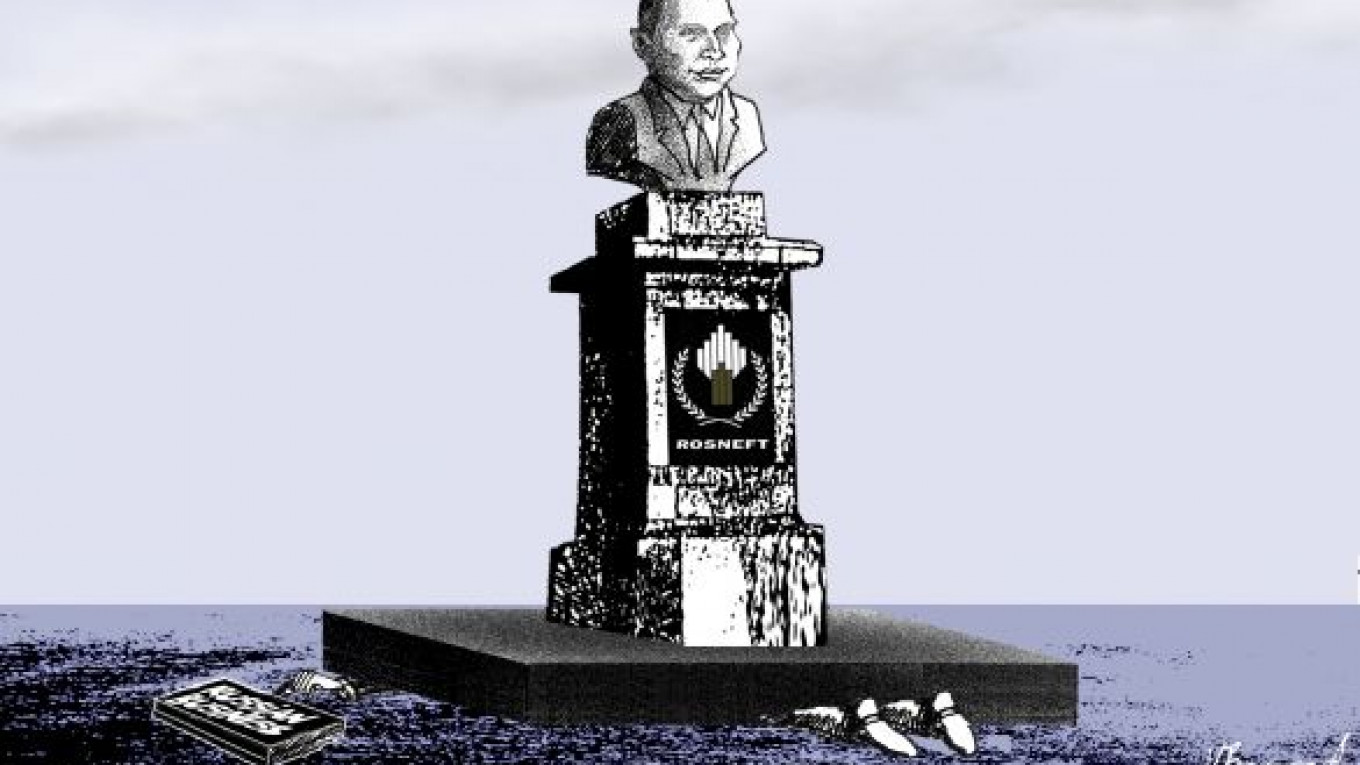The decision by BP and AAR, the Russian shareholders of TNK-BP, to sell their stakes to state-owned Rosneft crowns a very successful year for the company — and particularly for Rosneft CEO Igor Sechin. Before taking over TNK-BP, the country's third-largest oil company, Rosneft struck several multi-year investment deals. Earlier this year, Rosneft signed three agreements with ExxonMobil, Eni and Statoil exceeding $700 billion in total, an amount that dwarfs all other recent foreign direct investment in Russia combined.
What a difference a year makes. In 2011, Rosneft agreed on a joint venture with BP, but TNK-BP's Russian shareholders forced it to retreat from the deal. Now, Russian taxpayers will pay TNK-BP shareholders $45 billion in cash (and the rest in Rosneft shares). With this transaction, Sechin has built the largest publicly traded oil company in the world.
What changed? And what implications does Rosneft's takeover of TNK-BP have for Russian business?
Some observers are pointing to Sechin's growing importance. But the Rosneft deal should not be viewed simplistically as a realization of Sechin's personal dream of building a national oil champion in Russia.
After all, Sechin, widely believed to be a former KGB officer, was already powerful. He was in charge of Rosneft and, until May, was deputy prime minister responsible for the oil sector. When then-President Dmitry Medvedev announced in 2011 that government officials had to step down from state-owned companies' boards, Sechin quit his position as chairman of the board of Rosneft. But his successor, Alexander Nekipelov, publicly stated that he would continue to follow Sechin's recommendations on running the company.
Moreover, recent events have cast doubt on the idea that Sechin's position has become stronger. For example, since the Presidential Commission on Fuel and Energy came under President Vladimir Putin's control, Sechin has played a technical rather than a leadership role there. In addition, he lost a recent battle on whether to transfer Rosneft's dividends to the government budget or invest them in additional assets within Russia.
So why did the deal take place now? An important piece of the puzzle is Russia's macroeconomic position, particularly the capital account. Since September 2010, Russia has experienced a substantial net capital outflow, which reached $85 billion (4.5 percent of gross domestic product) in 2011. The outflow this year will likely be similar.
This capital flight is striking. Oil prices are high. Unlike the U.S. and Europe, Russia has zero sovereign debt, a balanced budget, a GDP growth of 4 percent, and inward foreign direct investment is growing. Yet the net capital outflow persists.
The only reasonable explanation for this is the quality of the investment climate. Although investment opportunities in Russia abound, they are outweighed by the risks of expropriation. That is why private shareholders prefer to sell to the state, and why foreign companies prefer to do business only with state companies.
Rosneft's expansion takes this logic to a new level. It is the ultimate proof of the Russian government's embrace of state capitalism, giving it control over the economy's commanding heights. The Russian state now owns Gazprom, the largest natural gas company in the world, Rosneft, which will now control 40 percent of the country's oil production, other oil companies, as well as major holdings in transportation, financial intermediation, defense and other sectors.
The Rosneft deal is especially important, as it turns an important page in Russian economic history. For many years, economists have been arguing that private property and competition are good for productivity and investment, relying upon a comparison between the natural gas and oil sectors. Unlike the gas industry, which has been dominated by Gazprom, the oil sector was privatized, creating a field with several key players. Just 10 years ago, the four largest oil firms were private. Whereas Gazprom's production stagnated and even fell, oil output increased by more than 50 percent over the course of several years.
Russian oil companies expanded outside of the country and invested in modern business processes and technology. Russia became the world's biggest oil producer, while it ceased to be the biggest producer of gas. But with the nationalization of three of the four oil players ?€” Yukos and Sibneft eight years ago and TNK-BP now ?€” Russia is set to build another Gazprom, this time in the oil industry.
Kremlinologists see in the Rosneft deal the rise of Sechin to the position of Russia's economic tsar, second only to Putin, the political tsar. Whether true or not, Sechin's fortunes are less important than what the takeover of TNK-BP means for the future of the Russian economy.
Though the Russian leadership denies that it is implementing state capitalism and affirms its commitment to privatization and competition, the Rosneft deal is a bold statement to the contrary. Russia's still-young market economy has now lost its last important bastion.
Sergei Guriev is rector of the New Economic School in Moscow. Aleh Tsyvinski is professor of economics at Yale University. © Project Syndicate
Related articles:
A Message from The Moscow Times:
Dear readers,
We are facing unprecedented challenges. Russia's Prosecutor General's Office has designated The Moscow Times as an "undesirable" organization, criminalizing our work and putting our staff at risk of prosecution. This follows our earlier unjust labeling as a "foreign agent."
These actions are direct attempts to silence independent journalism in Russia. The authorities claim our work "discredits the decisions of the Russian leadership." We see things differently: we strive to provide accurate, unbiased reporting on Russia.
We, the journalists of The Moscow Times, refuse to be silenced. But to continue our work, we need your help.
Your support, no matter how small, makes a world of difference. If you can, please support us monthly starting from just $2. It's quick to set up, and every contribution makes a significant impact.
By supporting The Moscow Times, you're defending open, independent journalism in the face of repression. Thank you for standing with us.
Remind me later.


